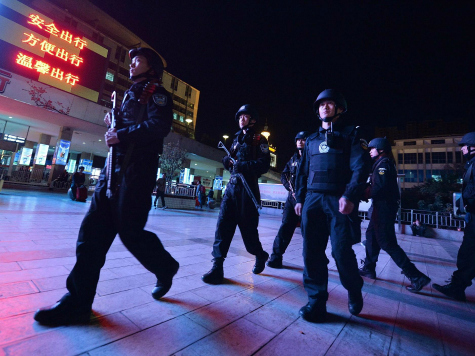
In remarks slated to be delivered at the bilateral “China-U.S. Strategic and Economic Dialogue,” Chinese President Xi Jinping declared decisively that China will continue its expansion and development, but urged the United States to join with China to “combat all forms of terrorism.”
The remarks, published in Chinese news outlet Xinhua, belie the peripheral conflicts that have increased tension between the United States and China in the past year, particularly the United States’ support of Japan in a territorial dispute over the uninhabited but resource-rich Senkaku Islands. Xi only speaks of potential cooperation. “Both sides should keep the big picture in sight and grasp the general goal of boosting the new model of major-country relationship,” he said. “The two countries should keep in mind that their common interests far overweight [sic] differences.”
The comments did not entirely shirk the issue of territorial disputes, as Xi requested a mutual respect for “territorial sovereignty,” as well, which may imply a request for the United States to not involve itself in the Senkaku dispute and not further any agreements such as the one President Obama confirmed with the Philippines earlier this year, which would maintain American military presence in the nation for the next decade.
Xi did have some specific suggestions for improving bilateral relations, however, and these included more national security discussion than some may have expected. He requested that the United States “strengthen military dialogue, combat all forms of terrorism, work together in dealing with climate change and promote communication and coordination on major international and regional issues.”
The communist Chinese government’s ability to subdue its territories and diminish individualist expression have come particularly under fire in the nation’s far west. The province of Xinjiang, particularly, is populated in majority by Muslim Uyghurs and borders Muslims territories, and as such has become a hub of terrorist activity within China. It has also been targeted by groups not currently active in China, like the Sunni jihadist Islamic State (formerly ISIS), which has declared its intent to establish an Islamist Caliphate that extends to China.
As the goals of Islamist terrorists, while also repressive, are by nature at odds with the goals of the government, terrorists have taken to attacking train stations and placing bombs to call attention to the demands of Muslims in the region. The Chinese government has retaliated with mass arrests and sentencing of terrorists, condemning suspected terrorists to death swiftly.
China has expanded its war on Islamist terrorists to Islam in general, banning fasting during the Muslim holy month of Ramadan or any public religious displays related to the month.
In addition to independently fighting against jihadists and potentially unaffiliated terrorists within their borders, the Chinese government has used the spread of ISIS in Iraq as an opportunity to extend its influence internationally, sending a special envoy to Iraqi Prime Minister Nouri al-Maliki and offering aid to the Iraqi military.
The call to the United States to aid in combatting terrorism could be used in the long run as a way to attack the Obama administration for being insufficiently involved in combatting such a threat, especially in areas like Iraq where the Obama administration is hesitant to commit fully. Conversely, further involvement by China could be used by the Chinese government to elevate its status as a world power.

COMMENTS
Please let us know if you're having issues with commenting.